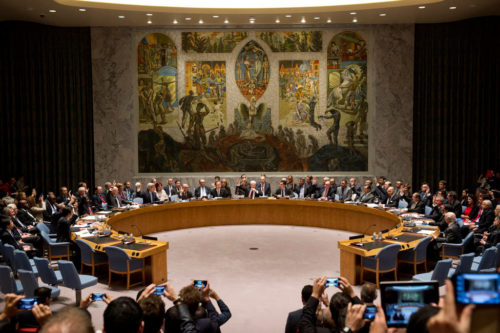Welcome back to Research Binder Friday! Today, we’ll be taking a look at one of the most exciting and coveted UN bodies – the United Nations Security Council.

Representing a country in the United Nations Security Council (UNSC) can easily be one of the most difficult debating environments within Model United Nations. The Security Council regularly fails to disappoint, with an extremely high level of debate and truly substantive solutions which try to solve the world’s most violent conflicts.
Committee History
The United Nations Security Council was established on the 24th of October 1945 after the end of the Second World War and held it’s first session on the 17th of January 1946. The Security Council is based in New York City and is the highest decision-making body within the United Nations. Ultimately the Security Council is the most powerful organ within the UN with the sole authority to use force in response to threats to international peace and security. Under article 23, Chapter 5 of the Charter, the composition of the Security Council is outlined as 15 members of the UN with 5 Permanent members who possess a veto power (China, France, Russia, United Kingdom and the United States of America) and 10 non-permanent members which are elected for a two-year term.
Committee Mandate
Under the UN Charter, the Security Council has the principal responsibility for the maintenance of international peace and security. As the only body that can use force in response to armed attacks, the Council plays a crucial role in the international community’s answer to all issues of conflict and violence. Therefore, while the Council has only been traditionally used to cover military and security-related issues, the Council has also passed resolutions on HIV/AIDS in Resolution 1308 (2000).
The UN Charter is in essence, essential for what the Council can and cannot do. Chapter VI of the Charter notes that the Council “may investigate any dispute or any situation which might lead to international friction or give rise to a dispute”. This means that the Council can mediate discussions between numerous warring parties.
However, Chapter VII of the Charter is the most important chapter concerning the powers of the council. Chapter VII gives the Council the board power to decide what measures should be taken in situations which involve “threats to peace, breaches of the peace, or acts of aggression”. This can include “may take such action by air, sea, or land forces as may be necessary to maintain or restore international peace and security” (Article 42) and also economic sanctions, which can solely be used by the Council.
Common Topics
As the main mandate of the committee is concerned with international peace and security, Security Council topics will usually focus on armed conflicts. While in recent times, Model UN conferences have focused on the rise of terrorist organizations, and the ongoing civil war in Syria, it is important to note that the Council is preoccupied with a large variety of conflicts worldwide as the only UN Committee that can authorize the use of force. This means that anywhere that there is a peacekeeping operation will require Security Council approval, resulting in a large range of topics.
The Security Council within Model United Nations
Within Model UN, the Security Council is often one of the most intense committees that a delegate can be a part of. Organizers of conferences will usually place the Security Council as an advanced committee, due to the high level of knowledge on the topics and rules of procedures required to be a succeed within committee. The high level of debate along with the constraints placed by the Council in the form of the veto from the permanent 5 members, will regularly demonstrate the necessity for compromise as even one vote against a resolution from the permanent 5 will cause a resolution to fail. Due to the importance of the rules of procedure in the council, the way that delegates declare themselves in the morning as present or present and voting can also drastically shape the way that the debate will take place during the conference.
As the UN Committee with the most power, the Council can also give delegates a wide range of creative solutions, so keep in mind that you as a delegate can come up with creative solutions to whichever topic you are debating! However, always try to strike a balance between satisfying the requirements of the permanent 5 members and what is feasibly possible when writing your resolutions.
Additional Best Delegate Resources
5 Tips on How to Succeed in the Security Council
How to Represent an Observer State in the Security Council
How to Accurately Simulate the UN Security Council for Model UN
Interested in Learning More About Crisis Committees?
Check out Best Delegate’s Model United Nations Institute Crisis Program this summer! Our Crisis Program teaches students advanced MUN skills and strategy specifically for crisis committees, all taught by the most accomplished crisis delegates from the college MUN circuit. Click here to learn more!
Other Insightful Resources
UN Charter: http://www.un.org/en/charter-united-nations/index.html
Security Council Reports: http://www.securitycouncilreport.org
Security Council Sanctions list: https://www.un.org/sc/suborg/en/sanctions/un-sc-consolidated-list
Functions and powers of the Security Council: http://www.un.org/en/sc/about/functions.shtml
Structure of the Security Council: http://www.un.org/en/sc/about/structure.shtml



